- Home
- Ian McDonald
King of Morning, Queen of Day Page 13
King of Morning, Queen of Day Read online
Page 13
Swinging back in as Fat Lettie went swinging out, she made her riposte: “Kindly inform the gent on table number six that he has a face like a shite that’s been stuck down the jax three days.”
In, and out again. Fat Lettie: “You’re a foul-mouthed hoor, Jessica Caldwell.”
Swing, bang. “You should open your legs and let your arse do the talking, Lettie dearest—it makes a lot more sense.”
And, on the return pass: “Well, at least my Eammon will be coming to pick me up in a motor car and take me out to Phoenix Park for a concert, Jessica Caldwell.”
Two tables served, three cleared, and one bill later. “In the Defence Forces, isn’t he, your Eammon? What’s it like, doing everything by numbers? Skirt up, two three; knickers down, two three…”
“You bitch, Jessica Caldwell. At least I’ve got a boyfriend.”
“And so’ve I, Lettie dear, and not some pissy toy soldier either—a real fightin’ man, he is, a rebel boy of the Irish Republican Army.”
“You are such a liar, Jessica Caldwell.”
Jessica Caldwell was not a liar. She was a creator of imaginative fictions. If persons had not enough wit to recognise an imaginative fiction—come, let us not quibble, a lie—when they were told one, the more fool they. She could not be responsible for people believing her sorry. imaginative fictions. Lying was as natural to her as song to a bird.
“Ladies, ladies, this is a public restaurant. The customers have come here to enjoy their luncheons, not to listen to you two going at it like two Montgomery Street harridans.” Brendan the head cook, as the only man in the kitchens, held an authority out of all proportion to his position. Doors banged, doors swung, and a tight and smoking silence endured until at last the clock woke from its meanderings and declared six o’clock. The peace and cool of Mangan’s back alley was almost sacramental. Jessica shook the day from her hair and stretched in a warm, vagrant sunlight the exact colour of Etruscan terra-cotta. A bird threw a snatch of song over the chimney pots and chipped roof slates. Jessica smoked a long and luxurious Woodbine while in stations named after dead patriots pig men and blowsy women slumped softly, sleepily, against each other, full to the watch pockets with Shopper’s Special Luncheon in trains taking them back to Mullingar and Kildare and every hole in the hedge in between.
An immense evening was unfolding, itself over the Georgian avenues of South Dublin like a backdrop for some extravagant production of Aida. The tram paused to deposit Jessica at the end of Belgrave Road before lumbering on toward the Victorian pomposities of Palmerstown. Piano music; Jocasta practising Mozart. Did she never tire of arpeggios and glissandos and diminuendos and all those other tedious Italians? At the age of five, Jessica had whispered to her father that she thought the front door looked like a smiling face, which delighted him so much it had become a piece of family legend; the brass welcome to number twenty. She waved to Jocasta,—sorry, Jo-Jo, it sounded more arty—the sister she did like, who returned a nod and a smile. Clattering down the stairs came Jasmine, a.k.a. The Shite, the sister she did not like, sullen, spotty, and bulgy in her Girls’ Brigade uniform.
“I’m supposed to bring a new song for the singsong tonight,” she said. It was almost an accusation of something.
“I know a great song you can teach them. It goes like this:
I stuck my finger up a woodpecker’s hole,
And the woodpecker said, ‘God bless my soul!
Take it down, take it down, take it down,
Take it down!’”
Exit The Shite, scandalised. Jessica mistrusted people who had too much religion, especially when those people were five years her junior.
“Jessica Caldwell!” The roar came from the paternal sanctorum at the top of the stairs. Jessica loved her father’s study only slightly less than she loved him; the triple latticed windows with their generous views of the garden and the trees of Palmerstown beyond, the cupola that cast its lotus of light over the writing desk and draughtsman’s table—for as long as she could remember, her impression of the study had been one of light and warmth. Charlie Caldwell was a designer of fine linen and tableware for Doheny and Nesbitt’s exclusive interior furnishings range. President Childers ate his dinner off a Charlie Caldwell plate, and had it served to him on a Charlie Caldwell tablecloth. His father before him had been a designer of tableware. His proudest boast was that his finest designs had gone down with the Titanic. Also like his father before, C. Caldwell cast himself forthrightly in the tradition of the Protestant Radical, two philosophies he considered severely undervalued in the new Ireland. The waxed-oak shelves of his study were stocked with books he felt reflected his dual heritage and which never failed to raise tuts of disapproval from Mr. Perrot, the clergyman, on his rare visits to the house. Mr. Perrot had always been disapproving of the Caldwell family. Anyone who called their children Jessica, Jocasta, and Jasmine was obviously suspect of heterodoxy. A valiant, and to date victorious battler against encroaching baldness, Charlie Caldwell attributed both his success in holding his hair and his intellectual vigour to Dwyer’s Electrical Scalp Massage (Why go Bald?).
“Jessica Caldwell, you are the most foul-mouthed little hellion it has been my misfortune to hand rear. Do you have to offend Jasmine’s tender sensibilities?”
“Ah, the way she goes on you’d think she had a lemon stuck up her backside.”
The guffaw of laughter almost sent the draughtsman over backwards in his Chippendale chair. “So, how was your day in the service of Mr. Mangan?”
“Fuc… bloody awful. Dad, why…”
“Why can’t you go to college to study to be an illustrator? A fine waste of money that’d be when you end up getting married to the first man you see and having babies. All that time and money down the drain.”
“Jocasta’s going to be a concert pianist, Is she a waste of time and money?”
“Jocasta has a great talent.”
“And I don’t? I can draw as well as you. Better.”
It was an old, entrenched argument. Jessica argued it now purely for the sake of arguing. As soon as she had enough money from Mangan’s Family Restaurant, she would apply herself to college to study illustration, and pay for it of her own sweat, see if she didn’t. She was Destined for Greatness. It was written by a greater hand than C. Caldwell, Esquire’s.
“Are you going to be in for dinner?”
She still did love her father, dearly.
“Well, I’d arranged with Rozzie and Em…”
“Abandon me to the wrath of your mother, would you, ungrateful child?”
She leaned over the desk and kissed him on the not-quite bald patch.
“Aw, Dad, for a mean ould bugger, you’re a honey.”
Down in the hall, heading for the front door (“’Bye, Jocasta; sorry, Jo-Jo,”), she encountered The Shite locked in incomprehensible intercourse with a pennant on a pole.
“Don’t forget verse two:
And the woodpecker said, ‘God bless my soul!
Turn it round, turn it round, turn it round,
Rotate it.’”
Christian Brothers’ School overshadowed Heytesbury Street like Purgatory over Pleasure. The houses facing it maintained a spirit of defiant disarray—basement yards piled with decrepit mangles and juggernaut perambulators; tarnished brass and rusting palings; geraniums condemned on windowsills to the contemplation of their own corruption; white, crumbly dog turds; and greasy paper bags. Jessica knew her mother thought Roslyn Fitzpatrick and her family were below the salt, despite the good Old Norman name and the fact that Rozzie, with Jessica and the third member of their clique, Emma Talbot, sang the occasional pious trio in church to the general edification and pleasure of all. Jessica’s mother’s opinions were generally of little importance to Jessica, who thought of herself as one who did not judge by outside appearances, but by the heart. Like Jesus. The front room of number thirty-eight was piled with ragamuffin furniture and Victorian prints of supposedly inspirational nature. Betwee
n Gentle Jesus Meek and Mild leading a Junior Life Boy along the straight and narrow path and a framed Biblical chronology from Eternity through Creation, Redemption, and Apocalypse to Eternity again, the wireless glowed and hummed and picked “The Billy Cotton Band Show” out of the ether.
“Anne-Marie next door says Father Cumper makes you say twenty Hail Mary’s and five Our Father’s for listening to the BBC,” Rozz said. She made the same pronouncement every time they tuned the wooden wireless away from Radio Eireann; it added a little clandestine frisson to their listening. Feet beat time to the punchy rhythms of saxes and clarinets; the girls flipped the soft, shiny pages of Picture Parade and Film Fun and talked about boys. Rozz was in love with Bing Crosby, King of the Crooners, but settled for a roving Hoover salesman. He had recently been elevated from Permission to French Kiss to Permission to Undo Bra, but Permission to Slip Hand Down Knickers was some months distant. Em had not progressed beyond the first tight-mouthed kiss in the back of the tuppennies in the Carlton Picture House, but then she had only been going out with her apprentice tiler from Haroldscross for three weeks. A Byzantine atmosphere of intrigue surrounded the affair. If her mother ever found out she was going out with a Catholic… Further comment was unnecessary. Jessica remained the sole unenthusiastic gooseberry,
“Oh, come on, Jessica, you’ll have to get off with someone soon or it’ll heal up down there.”
“Eduardo in the Cagliostro fancies you. I saw him looking at you the other night. I would say he definitely fancies you.”
Eduardo Cagliostro was a curly-headed Italian Adonis, who unfortunately knew it. He was the son of an immigrant fried food shop owner. It was commonly supposed he slicked back his hair by dipping his head in the fryers. He was a classic smoulderer—on a good night, he gave off more smoke than the hot fat. He was every inch the Latino until he opened his mouth; a first generation Italo-Irish, he had inherited none of his Mama’s lilting cadences. His Rathmines accent was as thick as a toilet seat. Jessica despised him and never wasted an opportunity to publicly humiliate him for his hubris. But it was getting to look like it was Eduardo Cagliostro or the Little League of Decency and Purity.
“What makes you think I haven’t got a boyfriend? In fact, I have. I’ve been going out with him for four weeks and three days now, but I can’t tell anyone about him.” Minor lies boomed and rushed in her head and fused into major, then epic, lies, the familiar prelude to a feat of sustained improvisation. “His name’s Damian. He’s tall and very handsome, of course, and he has hair as black as a raven’s wing. I don’t know his surname; he couldn’t tell me. In fact, I don’t even know if Damian is his real name. He says he can’t trust anyone, not even me. He has to be careful. It’s difficult to arrange meetings. He can’t meet me in the usual places everyone goes, he can’t risk being seen, so it’s usually after dark, on a particular bench in the park, or down an alley. He leaves messages for me at Hannah’s Sweet Shop. He can’t ever come to the house. I can’t risk Mum and Dad seeing him.” She took a deep breath.
“You see, he’s on the run. He’s a volunteer in the IRA.” Hoots of derision greeted her disclosure. “No, it’s true, I swear to God. He was in the Tipperary Brigade but he’s on a special mission in Dublin. That’s all he’ll let me know about it, but I think there’s someone high up in the Free State government he’s been sent to kill. He’s got a gun—a Webley revolver—he carries it with him all the time, in case he’s ambushed by the Specials and has to shoot his way out. He’s let me see it. He carries it under his army greatcoat, which he says he got from a soldier he shot in the Galtee Mountains. He won’t let me touch his gun, though; he says it’s not right for women to handle weapons. I think that’s so old-fashioned and romantic of him. He’s twenty-two and he’s absolutely gorgeous. I think it’s because he’s a hunted man. He says he wants to elope with me and live together on the run, but I tell him that’s silly, and then he gets all sad because he’s thinking that this night might be the last time he’ll ever see me—tonight might be the night he gets gunned down in the streets by the Special Branch.
“I don’t know where he goes or where he comes from. He says it’s safer for both of us if I don’t know, but I do know that he’s in the IRA because of his older brother who fought in the Civil War and was captured and executed by what he calls Free State Traitors. When he talks about his brother he gets very pale and quiet and dangerous.”
The April 1934 copy of Film Fun caught her in full extemporary flight; mouthful of Mae West.
“You’re such a liar, Jessica Caldwell.”
She waved two fingers in the face of her accusers. “Up your bums. It was a bloody good lie. I almost had you believing it, didn’t I?” Billy Cotton’s Big Band BBC Beat battled futilely against the Catholic evening gloom descending the slab walls of Christian Brothers’ School.
Waiting for the eleven o’clock tram, she noticed there was still brightness in the sky. A sure promise of summer, this blue lambency in the far west, the smoking chimney stacks of Dublin silhouetted against it like the palisades and siege-engines of the army of heaven. Dark crescents and scimitars darted between the angular shadows; the swifts, returned from the lands of the heathen Moor and Berber, cut and creased the violet night. She imagined how Dublin would seem through their eyes. The streets, the alleys, the entries, the roofs and chimney pots, the stone Hibernias and marble harps and wrought-iron Celtic crosses would lose their human meaning and flow into a seamless landscape of canyons and valleys, of cliff faces and shallow ledges. Recalling the Saturday matinee Westerns, she saw Dublin become a great Monument Valley of buttes and mesas and badlands through which she swooped and veered. Through red-brick canyons lined with ledges, over hogback rooftops, circling volcanic chimney mouths, she would fly, looking down into a valley of shining trees where ponderous smoky animals lurched in predestined and invariable courses. She caught sight of her own face, looking up at the flocking swifts.
The tram drew up in a spray of blue sparks. Jessica swung onto a seat at the back. Her mother always told her to sit by the door so she could jump up if anyone tried to, well, you know, try anything. She was still perplexed by her experience of the point of view of a bird. She had always enjoyed a vigorous imaginative life, and if lately she had found her dips into the stream of consciousness becoming more powerful and insistent, she had always known on which side of the dividing line between reality and imagination she stood. But this had been real. She had been there, for one moment; she had seen as the swifts saw, been as the swifts were. Her inner and outer Dublins, the visible and tangible Bailie Atha Cliath of reality and the invisible, intangible Anna Livia Pluribelle of the heart were beginning to lose their separate identities and blur: Ballia Liviatha Cliabelle.
The conductor was swinging his way up the tram, clicking his ticket machine. Jessica remembered that she had spent her fare home on a copy of Picture Parade from The Boulevard newsagents on Camden Street. Seat by seat the bulbous conductor loomed closer. Jessica improvised a barrage of lies, none of which stood the least possibility of convincing the conductor, when she remembered her emergency sixpence. Mother’s wisdom—the fund of final resort was tucked into her stocking top. Her attempts to surreptitiously slip it out only attracted the attention of the young dark-haired man in the heavy coat (surely too hot for a night like this) in the seat opposite. He smiled. Jessica scowled, wrestled with straining elastic, one hand down the inside of her skirt. Got it got it got it… The tram swayed over a set of points. The sixpence fell to the floor and rolled under the dark-haired man’s seat. Jessica commuted her shit to a sigh.
“Pardon me,” said the young dark-haired man. He bent down to rummage among the cigarette ends under the seat. The flap of that ridiculously heavy coat fell open. Tucked into the waistband of his trousers was an oiled black revolver.
There was a light on at the top of the stairs when she came through the smiling front door of number twenty. It did not seem a good omen. Father’s in his study late at ni
ght, all’s ill with the world. He opened the door, called her up in his I-don’t-want-to-wake-the-rest-of-the-house voice.
He did not look like any kind of a honey.
“I had a telephone call this evening,”
“That’s nice for you.”
“From Mr. Mangan. Apparently your performance was overheard by the entire lunchtime sitting. He gave me to understand in no uncertain terms that this was the last, the very last, time he was prepared to put up with this kind of behaviour.”
This was another well-established front of entrenched warfare.
“Oh, come on, you’re not serious…”
But he was serious.
“Really, Jessica, it can’t go on. The swearing, the lying, this compulsive vulgarity. It’s only a matter of time before you insult some customer. We really will have to do something about it.”
“You’re always saying that.”
“Which is my failing. No, this time, I have done something about it. I have made an appointment for you to see a specialist in problems of adolescents, a psychologist, a Dr. Rooke.”
“Are you saying that I’m a problem adolescent? Jaysus, Dad.”
He sighed, hands cast up in a gesture of resignation.
“The appointment has been fixed for Saturday morning. Eleven o’clock.”
“For fuc…” Then she saw the look of beleaguered defiance in his hands and eyes, and because she did love him, said, “Oh, all right, I’ll go. It might be a laugh. You never know…”
3
ANYONE WHO CALLS MY aged secretary Miss Fanshawe’s beloved Scottie Cromlyn a “little trigger” to Miss Fanshawe’s hatchet face is worthy of my undying admiration, and a certain degree of professional respect. I had been looking forward to this meeting with Jessica Caldwell.

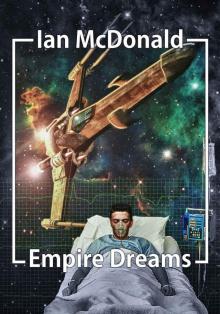 Empire Dreams
Empire Dreams The Menace from Farside
The Menace from Farside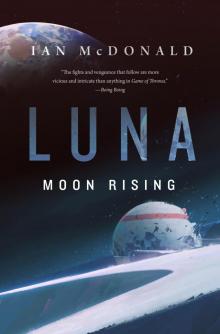 Luna: Moon Rising
Luna: Moon Rising Moon Rising
Moon Rising Desolation Road dru-1
Desolation Road dru-1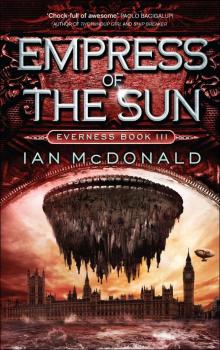 Empress of the Sun
Empress of the Sun Ares Express dru-2
Ares Express dru-2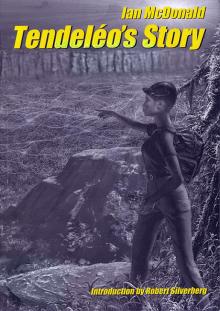 Tendeléo’s Story
Tendeléo’s Story River Of Gods
River Of Gods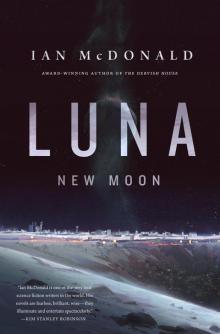 Luna
Luna![Cyberabad Days - [River of Gods 02] Read online](http://i1.bookreadfree.com/i1/03/29/cyberabad_days_-_river_of_gods_02_preview.jpg) Cyberabad Days - [River of Gods 02]
Cyberabad Days - [River of Gods 02]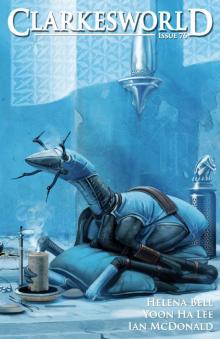 Clarkesworld Magazine Issue 76
Clarkesworld Magazine Issue 76 Brasyl (GollanczF.)
Brasyl (GollanczF.)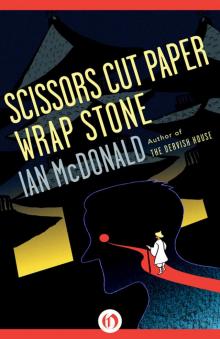 Scissors Cut Paper Wrap Stone
Scissors Cut Paper Wrap Stone Chaga
Chaga Time Was
Time Was Cyberabad Days
Cyberabad Days Be My Enemy
Be My Enemy Changa
Changa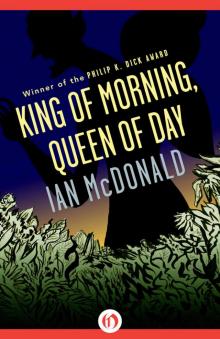 King of Morning, Queen of Day
King of Morning, Queen of Day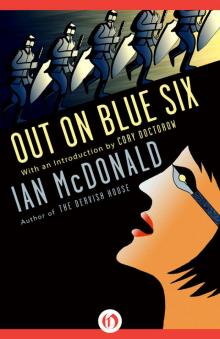 Out on Blue Six
Out on Blue Six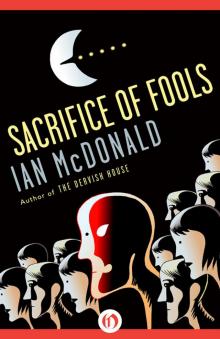 Sacrifice of Fools
Sacrifice of Fools Desolation Road
Desolation Road Luna--Wolf Moon--A Novel
Luna--Wolf Moon--A Novel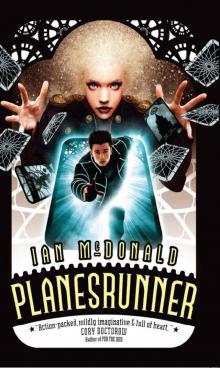 Planesrunner (Everness Book One)
Planesrunner (Everness Book One) Ares Express
Ares Express